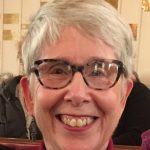Jewish learning Caring for Our Spirits in a Virtual Community

I believe there is something in the language of poetry that invites us to locate a deeper place within ourselves that, in the business of life, we often miss. Or for those of us comfortable with God language, poetry conveys in its metaphors, images, and pacing a possible connection between us and a Divine Energy — a divine source. That source could be located way beyond us, transcendent, or perhaps deep within, an immanent understanding of God.
Have you ever considered that listening to identify what is meaningful to you could be a sanctified act, a spiritual practice? I think about this a lot, especially during these challenging times. As a psychotherapist and as a spiritual director, and simply as a human being, I want to care for my spiritual well-being so I can be present most fully for others.
Combining all of the above, I responded with alacrity to the invitation of CJP/Hebrew College to propose a webinar to be offered to the community during this stay-at-home directive. I had offered “Poetry as a Spiritual Exercise” several times before, and wondered how it would be different virtually.
In order to foster a more intimate learning experience, CJP asked me to offer my session twice on Tuesday March 31st. I was delighted to see that fifteen people attended the afternoon session and twenty-five at night. I confess I didn’t anticipate (though I had hoped) that participants would be so eager to contribute and how patiently they listened to each other. I was also surprised by how quickly we formed ourselves into a community of learners.
I offered three poems—Mary Oliver’s When I am Among Trees; William Channing’s Symphony of Life; Ellery Aker’s The Word That is a Prayer. The first poem connected us easily into the world of nature which, in the face of our physical distancing, seems so important right now. The second poem was like an ethical will; timely in this moment when everyone’s vulnerability is quite heightened. The final poem, most challenging, is a reminder that regardless of the circumstance there is always someone more needy than we are and we must try hard to pay attention.
The participants witnessed each other patiently, reflecting silently and then articulately; they openly shared their feelings and observations with others who were strangers only 30 minutes before. Through that openness, they co-created virtual community. Some participants took time to journal about their experiences; I also heard from one person afterwards who shared that he was writing his own poetry as a response to the experience of being quarantined.
Perhaps you would want to read and respond to these poems too. My advice is this: read the poem out loud; find the particular words that resonate with you; sit with them awhile; locate yourself deeply within them.
Wishing you well, both in body and spirit.
 Roslyn Weiner, PhD, STM is a psychologist and spiritual director living and working in Newton MA, and a member of Temple Emanuel. She hopes to offer more opportunities to explore poetry as a spiritual exercise.
Roslyn Weiner, PhD, STM is a psychologist and spiritual director living and working in Newton MA, and a member of Temple Emanuel. She hopes to offer more opportunities to explore poetry as a spiritual exercise.

